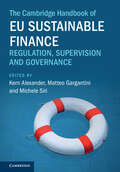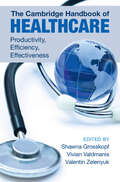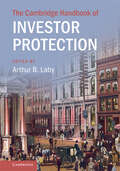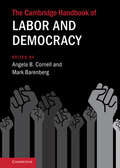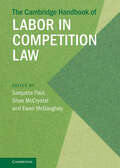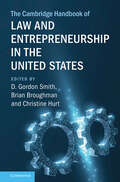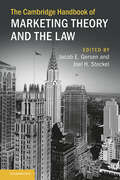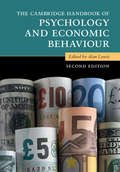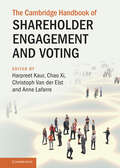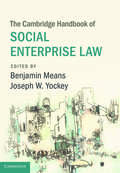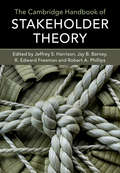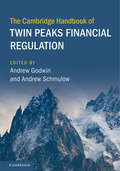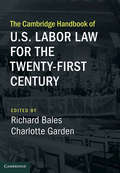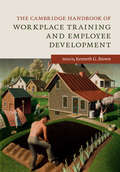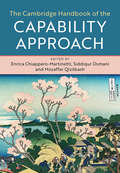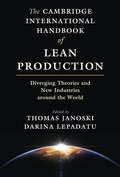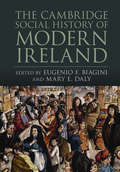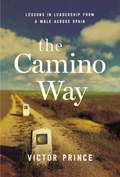- Table View
- List View
The Cambridge Handbook of EU Sustainable Finance: Regulation, Supervision and Governance (Cambridge Law Handbooks)
by Kern Alexander Michele Siri Matteo GargantiniThis essential reference work explores the role of finance in delivering sustainability within and outside the European Union. With sustainability affecting core elements of company, banking and capital markets law, this handbook investigates the latest regulatory strategies for protecting the environment, delivering a fairer society and improving governance. Each chapter is written by a leading scholar who provides a solid theoretical approach to the topic while focussing on recent developments. Looking beyond the European Union, the book also covers relevant developments in the United States, the United Kingdom and other major jurisdictions. Thorough and comprehensive, this volume is a crucial resource for scholars, policymakers and practitioners who aim for a greener world, a more equitable society and better-managed corporations.
The Cambridge Handbook of Healthcare: Productivity, Efficiency, Effectiveness
by Shawna Grosskopf Vivian Valdmanis Valentin ZelenyukHealthcare is inextricably bound to productivity, efficiency, and economic development. Although many methods for analyzing productivity and efficiency have been extensively covered, relatively little focus has been placed on how those methods can be applied to health care in a coherent and comprehensive manner. The Cambridge Handbook of Healthcare outlines current foundations and states of the art on which future research can build. It brings together experts in this growing field to cover three key sources and aspects of human welfare – productivity, efficiency, and healthcare. Beginning with academic focused chapters, this book bridges and provides outreach to the practice and regulation of the health care industry and includes academic and regulatory perspectives, including overviews of major evidence from international empirical applications. Each chapter is dedicated to a particular topic and delivered by international experts on that topic.
The Cambridge Handbook of Investor Protection (Cambridge Law Handbooks)
by Arthur B. LabyThe topic of investor protection has occupied investors, businesses, regulators, academics, and courts since the 1930s. The topic exploded in importance after the 2008 financial crisis and the Bernard Madoff Ponzi scheme of the same year. Investor protection scholarship now seeks to respond to developments such as the institutionalization of the markets, the democratization of finance, and the enhanced role of market professionals and other gatekeepers. Additionally, although the philosophy of full disclosure remains the guiding principle behind the securities laws, recent research has questioned the merits of a disclosure-based regime. In light of these trends, regulators try to strike the right balance between imposing a strict investor protection regime, on the one hand, and giving businesses the freedom to innovate new projects, market new services, and reduce costs, on the other. The Cambridge Handbook of Investor Protection brings together leading scholars to inform this debate and fill a gap left by these developments.
The Cambridge Handbook of Labor and Democracy (Cambridge Law Handbooks)
by Angela B. Cornell Mark BarenbergWe are currently witnessing some of the greatest challenges to democratic regimes since the 1930s, with democratic institutions losing ground in numerous countries throughout the world. At the same time organized labor has been under assault worldwide, with steep declines in union density rates. In this timely handbook, scholars in law, political science, history, and sociology explore the role of organized labor and the working class in the historical construction of democracy. They analyze recent patterns of democratic erosion, examining its relationship to the political weakening of organized labor and, in several cases, the political alliances forged by workers in contexts of nationalist or populist political mobilization. The volume breaks new ground in providing cross-regional perspectives on labor and democracy in the United States, Europe, Latin America, Africa, and Asia. Beyond academia, this volume is essential reading for policymakers and practitioners concerned with the relationship between labor and democracy.
The Cambridge Handbook of Labor in Competition Law The Cambridge Handbook of Labor in Competition Law (Cambridge Law Handbooks)
by Shae McCrystal Ewan McGaughey Sanjukta PaulAs scholars and policymakers around the world seek a systematic approach to the question of 'gig work,' one of its regulatory dimensions – the intersection of labor and competition law – points toward a deeper reconceptualization of the conventional legal and economic categories typically brought to bear upon it. A comparative approach to the question of gig work further reveals the variety and contingency of background assumptions that are often overlooked in the context of domestic policy debates. By combining a detailed comparative doctrinal survey of the regulation of non-employee workers in domestic competition law systems with a set of essays reframing the underlying questions raised – in terms of international legal frameworks, freedom of association norms, alternative approaches to law and economics, and more – The Cambridge Handbook of Labor in Competition Law moves the debates over the fissured workplace and the labor – competition law intersection forward in novel ways.
The Cambridge Handbook of Law and Entrepreneurship in the United States (Cambridge Law Handbooks)
by D. Gordon Smith Brian J. Broughman Christine HurtLaw plays a key role in determining the level of entrepreneurial action in society. Legal rules seek to define property rights, facilitate private ordering, and impose liability for legal wrongs, thereby attempting to establish conditions under which individuals may act. These rules also channel the development of technology, regulate information flows, and determine parameters of competition. Depending on their structure and implementation, legal rules can also discourage individuals from acting. It is thus crucial to determine which legal rules and institutions best enable entrepreneurs, whose core function is to challenge incumbency. This volume assembles legal experts from diverse fields to examine the role of law in facilitating or impeding entrepreneurial action. Contributors explore issues arising in current policy debates, including the incentive effect of legal rules on startup activity; the role of law in promoting or foreclosing market entry; and the effect of entrepreneurial action on legal doctrine.
The Cambridge Handbook of Marketing and the Law (Cambridge Law Handbooks)
by Jacob E. Gersen Joel H. SteckelThis handbook examines a wide range of current legal and policy issues at the intersection of marketing and the law. Focusing on legal outcomes that depend on measurements and interpretations of consumer and firm behavior, the chapters explore how consumers form preferences, perceptions, and beliefs, and how marketers influence them. Specific questions include the following: How should trademark litigation be valued and patent damages assessed? What are the challenges in doing so? What divides certain marketing claims between fact and fiction? Can a litigant establish secondary meaning without a survey? How can one extract evidence on consumer behavior with the explosion of social media? This unique volume at the intersection of marketing and the law brings together an international roster of scholars to answer these questions and more.
The Cambridge Handbook of Meeting Science
by Allen, Joseph A. and Lehmann-Willenbrock, Nale and Rogelberg, Steven G. Joseph A. Allen Nale Lehmann-Willenbrock Steven G. RogelbergThis first volume to analyze the science of meetings offers a unique perspective on an integral part of contemporary work life. More than just a tool for improving individual and organizational effectiveness and well-being, meetings provide a window into the very essence of organizations and employees' experiences with the organization. The average employee attends at least three meetings per week and managers spend the majority of their time in meetings. Meetings can raise individuals, teams, and organizations to tremendous levels of achievement. However, they can also undermine effectiveness and well-being. The Cambridge Handbook of Meeting Science assembles leading authors in industrial and organizational psychology, management, marketing, organizational behavior, anthropology, sociology, and communication to explore the meeting itself, including pre-meeting activities and post-meeting activities. It provides a comprehensive overview of research in the field and will serve as an invaluable starting point for scholars who seek to understand and improve meetings.
The Cambridge Handbook of Psychology and Economic Behaviour
by Alan LewisPsychologists have been observing and interpreting economic behaviour for at least fifty years, and the last decade, in particular, has seen an escalated interest in the interface between psychology and economics. The Cambridge Handbook of Psychology and Economic Behaviour is a valuable reference resource dedicated to improving our understanding of the economic mind and economic behaviour. Employing empirical methods - including laboratory experiments, field experiments, observations, questionnaires and interviews - the Handbook covers aspects of theory and method, financial and consumer behaviour, the environment and biological perspectives. With contributions from distinguished scholars from a variety of countries and backgrounds, the Handbook is an important step forward in the improvement of communications between the disciplines of psychology and economics. It will appeal to academic researchers and graduates in economic psychology and behavioural economics.
The Cambridge Handbook of Psychology and Economic Behaviour (Cambridge Handbooks in Psychology)
by Alan LewisPsychologists have been observing and interpreting economic behaviour for at least fifty years, and the last decade, in particular, has seen an escalated interest in the interface between psychology and economics. The Cambridge Handbook of Psychology and Economic Behaviour is a valuable reference resource dedicated to improving our understanding of the economic mind and economic behaviour. Employing empirical methods - including laboratory experiments, field experiments, observations, questionnaires and interviews - the Handbook covers aspects of theory and method, financial and consumer behaviour, the environment, and biological perspectives. With contributions from distinguished scholars from a variety of countries and backgrounds, the Handbook is an important step forward in the improvement of communications between the disciplines of psychology and economics. It will appeal to academic researchers and graduates in economic psychology and behavioural economics.
The Cambridge Handbook of Shareholder Engagement and Voting (Cambridge Law Handbooks)
by Chao Xi Harpreet Kaur Van der Elst, Christoph Anne LafarreAll over the world, companies play an important role in the economy. Different types of stakeholders hold the reins in these companies. An important class are the shareholders that finance the activities of these companies. In return, stakeholders have a say on how these companies should be organized and structure their activities. This is primarily done through voting and engaging. These mechanisms of voting and engaging allow the shareholders to decide significant aspects of the company structure, from who governs it to how much directors are paid. However, how shareholders vote and engage and how far their rights stretch are organized differently in different countries. This pioneering book provides insights into what rights these shareholders have and how the shareholders of companies in nineteen different jurisdictions participate in corporate life through voting and engaging. Comparative and international in scope, it pays particular attention to how jurisdictions align and differ around the world.
The Cambridge Handbook of Social Enterprise Law
by Benjamin Means Joseph W. YockeyGrowing numbers of employees, consumers, and investors want companies to be truly good; these stakeholders will accept lower economic returns in order to support companies that prioritize sustainability, fair wages, and fair trade. Unlike charities or non-profit organizations, such companies - or social enterprises - are not only permitted but also expected to produce an economic return for investors. Yet, unlike traditional business ventures, social enterprises have no obligation to maximize profits, even on a long-term basis. In this comprehensive volume, Benjamin Means and Joseph W. Yockey bring together leading legal scholars and practitioners to offer an authoritative guide to social enterprise law and policy. The Cambridge Handbook of Social Enterprise Law takes stock of the field and charts a course for its future development. It should be read by entrepreneurs, investors, practitioners, academics, students and anyone else interested in how companies are evolving to address new demands for capitalism with a conscience.
The Cambridge Handbook of Stakeholder Theory
by R. Edward Freeman Jeffrey S. Harrison Jay B. Barney Robert A. PhillipsIn the decades since R. Edward Freeman first introduced stakeholder theory, which views firms in terms of their relationships to a broad set of partners, the stakeholder approach has drawn increasing attention as a model for ethical business. Edited by Freeman, alongside other leading scholars in stakeholder theory and strategic management, this handbook provides a comprehensive foundation for study in the field, with eighteen chapters covering some of the most important topics in stakeholder theory written by respected and highly cited experts. The chapters contain an overview of the topic, an examination of the most important research on the topic to date, an evaluation of that research, and suggestions for future directions. Given the pace of new scholarship in the field, this handbook will provide an essential reference on both foundational topics as well as new applications of stakeholder theory to entrepreneurship, sustainable business, corporate responsibility, and beyond.
The Cambridge Handbook of Twin Peaks Financial Regulation (Cambridge Law Handbooks)
by Andrew Godwin Andrew SchmulowFirst proposed in 1994, the Twin Peaks model of financial system regulation employs two specialist peak regulators: one charged with the maintenance of financial system stability, and the other with market conduct and consumer protection. This volume, with contributions from over thirty scholars and senior regulators, provides an in-depth analysis of the similarities and differences in the Twin Peaks regimes that have been adopted around the world. Chapters examine the strengths and weaknesses of the model, provide lessons from Australia (the first to adopt the model), and offer a comparative look at the potential suitability of the model in leading non-Twin Peaks jurisdictions. A key resource for central bankers, public policy analysts, lawyers, economists, politicians, academics and students, this work provides readers with a comprehensive understanding of the Twin Peaks model, and a roadmap for countries considering its adoption.
The Cambridge Handbook of U.S. Labor Law for the Twenty-First Century (Cambridge Law Handbooks)
by Richard Bales Charlotte GardenOver the last fifty years in the United States, unions have been in deep decline, while income and wealth inequality have grown. In this timely work, editors Richard Bales and Charlotte Garden - with a roster of thirty-five leading labor scholars - analyze these trends and show how they are linked. Designed to appeal to those being introduced to the field as well as experts seeking new insights, this book demonstrates how federal labor law is failing today's workers and disempowering unions; how union jobs pay better than nonunion jobs and help to increase the wages of even nonunion workers; and how, when union jobs vanish, the wage premium also vanishes. At the same time, the book offers a range of solutions, from the radical, such as a complete overhaul of federal labor law, to the incremental, including reforms that could be undertaken by federal agencies on their own.
The Cambridge Handbook of Workplace Training and Employee Development (Cambridge Handbooks in Psychology)
by Brown Kenneth G.With comprehensive coverage of topics related to learning, training, and development, this volume is a must-have resource for industrial and organizational (I/O) psychologists, human resource (HR) scholars, and adult education specialists. Brown provides a forward-looking exploration of the current research on workplace training, employee development, and organizational learning from the primary point of view of industrial organizational psychology. Each chapter discusses current practices, recent research, and, importantly, the gaps between the two. In analyzing these aspects of the topic, the chapter authors both present the valuable knowledge available and show the opportunities for further study and practice.
The Cambridge Handbook of the Capability Approach
by Enrica Chiappero-Martinetti Mozaffar Qizilbash Siddiqur OsmaniThis landmark handbook collects in a single volume the current state of cutting-edge research on the capability approach. It includes a comprehensive introduction to the approach as well as new research from leading scholars in this increasingly influential multi-disciplinary field, including the pioneers of capability research, Martha C. Nussbaum and Amartya Sen. Incorporating both approachable introductory chapters and more in-depth analysis relating to the central philosophical, conceptual and theoretical issues of capability research, this handbook also includes analytical and measurement tools, as well as policy approaches which have emerged in the recent literature. The handbook will be an invaluable resource for students approaching the capability approach for the first time as well as for researchers engaged in advanced research in a wide range of disciplines, including development studies, economics, gender studies, political science and political philosophy.
The Cambridge History of Capitalism: From 1848 to the Present
by Jeffrey G. Williamson Larry NealThe second volume of The Cambridge History of Capitalism provides an authoritative reference on the spread and impact of capitalism across the world, and the varieties of responses to it. Employing a wide geographical coverage and strong comparative outlook, a team of leading scholars explore the global consequences that capitalism has had for industry, agriculture and trade, along with the reactions by governments, firms and markets. The authors consider how World War I halted the initial spread of capitalism, but global capitalism arose again by the close of the twentieth century. They explore how the responses of labor movements, compounded by the reactions by political regimes, whether defensive or proactive, led to diverse military and welfare consequences. Beneficial results eventually emerged, but the rise and spread of capitalism has not been easy or smooth. This definitive volume will have widespread appeal amongst historians, economists and political scientists.
The Cambridge International Handbook of Lean Production: Diverging Theories and New Industries around the World
by Thomas Janoski Darina LepadatuThis handbook focuses on two sides of the lean production debate that rarely interact. On the one hand, management and industrial engineering scholars have presented a positive view of lean production as the epitome of efficiency and quality. On the other hand, sociology, industrial relations, and labor relations scholars focus on work speedups, management by stress, trade union positions, and self-exploitation in lean teams. The editors of this volume understand the merits of both views and present them accordingly, bridging the gaps among five disciplines and presenting the best of each perspective. Chapters by internationally acclaimed authors examine the positive, negative and neutral possible effects of lean, providing a global view of lean production while adjusting lean to the cultural and political contexts of different nation-states. As the first multi-lens view of lean production from academic and consultant perspectives, this volume charts a way forward in the world of work and management in our global economy.
The Cambridge Introduction to Performance Theory
by Simon ShepherdWhat does 'performance theory' really mean and why has it become so important across such a large number of disciplines, from art history to religious studies and architecture to geography? In this introduction Simon Shepherd explains the origins of performance theory, defines the terms and practices within the field and provides new insights into performance's wide range of definitions and uses. Offering an overview of the key figures, their theories and their impact, Shepherd provides a fresh approach to figures including Erving Goffman and Richard Schechner and ideas such as radical art practice, performance studies, radical scenarism and performativity. Essential reading for students, scholars and enthusiasts, this engaging account travels from universities into the streets and back again to examine performance in the context of political activists and teachers, countercultural experiments and feminist challenges, and ceremonies and demonstrations.
The Cambridge Revival of Political Economy (Economics as Social Theory)
by Nuno Ornelas MartinsThe marginalist revolution of the late nineteenth century consolidated what Karl Marx and Piero Sraffa called ‘vulgar economy’, bringing with it an emphasis on a scarcity theory that replaced the classical surplus theory. However, the classical political economy of Adam Smith and David Ricardo has been revived within the Cambridge economic tradition. This book looks at how different branches of the Cambridge economic tradition have focused on various aspects of this revival over time. The author shows that classical political economy is distinct from vulgar political economy in terms of its economic, social, and ethical theory, with each difference resting on an issue of ontology. Structured in three parts, the book examines the central contested aspects of these theories, namely the nature of value, the relationship between human beings and social structure, and the nature of human wellbeing. The Cambridge Revival of Political Economy will be relevant to students and researchers within the fields of political economy, history of economic thought, politics and philosophy.
The Cambridge Social History of Modern Ireland
by Mary E. Daly Biagini Eugenio F.Covering three centuries of unprecedented demographic and economic changes, this textbook is an authoritative and comprehensive view of the shaping of Irish society, at home and abroad, from the famine of 1740 to the present day. The first major work on the history of modern Ireland to adopt a social history perspective, it focuses on the experiences and agency of Irish men, women and children, Catholics and Protestants, and in the North, South and the diaspora. An international team of leading scholars survey key changes in population, the economy, occupations, property ownership, class and migration, and also consider the interaction of the individual and the state through welfare, education, crime and policing. Drawing on a wide range of disciplinary approaches and consistently setting Irish developments in a wider European and global context, this is an invaluable resource for courses on modern Irish history and Irish studies.
The Camino Way: Lessons in Leadership from a Walk Across Spain
by Victor PrinceStretching across 500 miles of northern Spain, the Camino de Santiago has been a pilgrimage route for a millennium. Each year, hundreds of thousands of peregrinos make their way through rugged countryside and medieval towns in order to reflect, test their will, and join a community of strangers on a shared mission. In short, it's the ideal training ground for authentic leadership.Challenged to walk the Camino, Victor Prince began his trek as one person: driven, work-focused and highly competitive, and he finished it a very different one: more balanced, more caring, and more present in the moment. In this transformative book he guides readers on their own Camino, translating his experience into seven essential leadership lessons inspired by the values emblazoned on the back of every pilgrim's passport:Treat each day as its own adventureMake others feel welcomeLearn from those who've walked beforeConsider your impact on those who followAnd moreLeadership is a journey. The Camino Way prepares you to tackle it with a pilgrim's heart, a wayfarer's grit, and a leader's vision.
The Campbell Home (A)
by Matthew Preble Leslie K. JohnCampbell siblings Thomas and Sally are faced with selling their childhood home. They need to make several difficult consequential decisions, all the while navigating their contentious relationship. Did it make sense to hire a broker, or should they go it alone? How much was the home worth? What should the listing price be? Most importantly, what combination of answers would get them the best outcome? And along the way, as they gather information to answer these questions, several unforeseen events occur.
The Campbell Home (B)
by Matthew Preble Leslie K. JohnCampbell siblings Thomas and Sally are faced with selling their childhood home. They need to make several difficult consequential decisions, all the while navigating their contentious relationship. Did it make sense to hire a broker, or should they go it alone? How much was the home worth? What should the listing price be? Most importantly, what combination of answers would get them the best outcome? And along the way, as they gather information to answer these questions, several unforeseen events occur.
